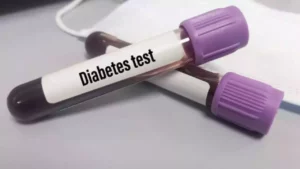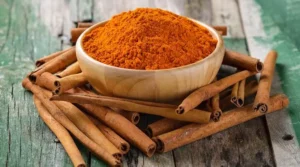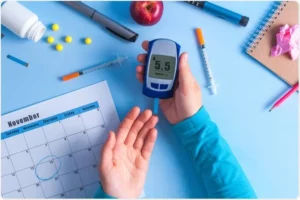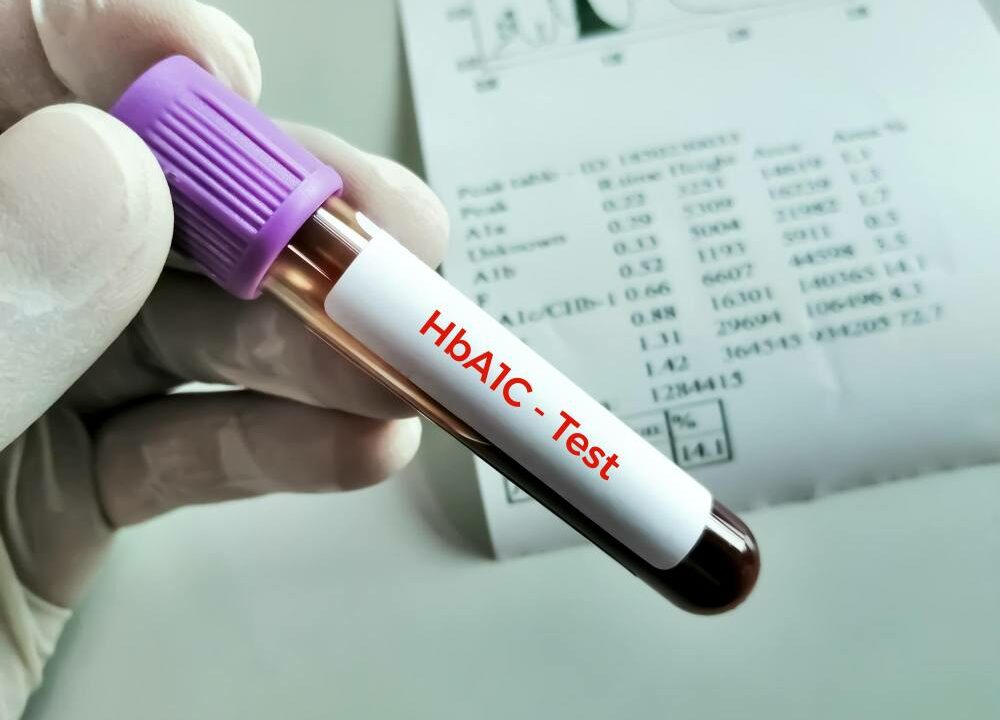High HbA1c levels can be challenging, but with the right knowledge and proactive measures, it’s possible to regain control over your health. In this blog, we’ll delve into the intricacies of high HbA1c, exploring what it means and most importantly, effective high HbA1c treatments and lifestyle changes that can help bring those levels back to a healthier range. Whether you’re personally dealing with elevated HbA1c or supporting someone who is, this guide aims to empower you with information on high HbA1c treatment to make informed decisions and take positive steps toward better diabetes management.
Contents
What Is High HbA1c?
 High HbA1c, or glycated hemoglobin, is a crucial indicator of long-term blood sugar control and serves as a key diagnostic marker for diabetes. HbA1c forms when hemoglobin, the protein in red blood cells that carries oxygen, combines with glucose in the bloodstream. This process, known as glycation, occurs continuously, and the resulting HbA1c reflects the average blood sugar levels over the past two to three months.
High HbA1c, or glycated hemoglobin, is a crucial indicator of long-term blood sugar control and serves as a key diagnostic marker for diabetes. HbA1c forms when hemoglobin, the protein in red blood cells that carries oxygen, combines with glucose in the bloodstream. This process, known as glycation, occurs continuously, and the resulting HbA1c reflects the average blood sugar levels over the past two to three months.
For individuals without diabetes, HbA1c levels typically range between 4% and 5.6%. However, elevated levels beyond this range suggest a persistent elevation of blood sugar, indicating poor glucose control. In the context of diabetes, high HbA1c levels are concerning as they correlate with an increased risk of complications such as cardiovascular disease, kidney damage, and nerve disorders. The goal of diabetes management is often to keep HbA1c levels within a target range to minimize these risks.
Which Medicine Is Best For High HbA1c?
The choice of medication for high HbA1c (indicative of poor blood sugar control, often associated with diabetes) depends on various factors, including the individual’s overall health, specific diabetes diagnosis (type 1 or type 2), and other medical conditions. Different medications work in various ways to lower blood sugar levels. Here are some common classes of medications used to treat high HbA1c:
- Metformin: Often the first-line medication for type 2 diabetes, metformin helps lower blood sugar by reducing the amount of glucose produced by the liver and increasing insulin sensitivity in the body.
- Sulfonylureas: Medications like glipizide, glyburide, and glimepiride stimulate the pancreas to release more insulin, helping to lower blood sugar levels.
- DPP-4 Inhibitors (Dipeptidyl Peptidase-4 Inhibitors): Drugs such as sitagliptin and saxagliptin work by increasing the levels of incretins, hormones that stimulate insulin release and decrease the amount of glucose produced by the liver.
- GLP-1 Receptor Agonists (Glucagon-Like Peptide-1 Receptor Agonists): Injectable medications like exenatide and liraglutide mimic the action of incretins, promoting insulin release, slowing down digestion, and reducing blood sugar levels.
- SGLT2 Inhibitors (Sodium-Glucose Cotransporter-2 Inhibitors): Medications like empagliflozin and canagliflozin help the kidneys remove excess glucose from the body through urine.
- Insulin: For individuals with more advanced diabetes or insufficient response to oral medications, insulin therapy may be necessary. Various types of insulin, such as rapid-acting, short-acting, intermediate-acting, and long-acting, provide flexibility in managing blood sugar levels.
It’s important to note that the choice of medication is highly individualized. Thus healthcare professionals determine the most suitable treatment based on factors such as overall health, lifestyle, and potential side effects. Regular monitoring, lifestyle modifications (such as diet and exercise), and open communication with healthcare providers are essential components of effective diabetes management.
What Are Some Holistic High HbA1c Treatment Options?
 Holistic high HbA1c treatment options involve a comprehensive strategy that encompasses lifestyle changes, dietary modifications, stress management, and alternative therapies. While these approaches should complement conventional medical treatments, they can contribute significantly to improving overall well-being. Here are some holistic high HbA1c treatment options:
Holistic high HbA1c treatment options involve a comprehensive strategy that encompasses lifestyle changes, dietary modifications, stress management, and alternative therapies. While these approaches should complement conventional medical treatments, they can contribute significantly to improving overall well-being. Here are some holistic high HbA1c treatment options:
Dietary Changes
Adopting a low-glycemic diet is a cornerstone of holistic high HbA1c management. Prioritize whole, unprocessed foods with a low glycemic index, such as quinoa, legumes, leafy greens, and berries. This approach helps regulate blood sugar levels by preventing rapid spikes and crashes. Additionally, practicing portion control is crucial. Monitoring serving sizes ensures a balance between energy intake and utilization, preventing overeating and contributing to stable blood sugar levels.
Regular Exercise
Engaging in regular physical activity is a powerful holistic strategy for managing high HbA1c. Aerobic exercises, like brisk walking or cycling, enhance insulin sensitivity, allowing cells to more efficiently absorb glucose. Incorporating strength training into your routine also contributes to improved glucose metabolism by building lean muscle mass. A combination of aerobic and strength exercises promotes overall health and aids in blood sugar control.
Stress Management
Chronic stress can negatively impact blood sugar levels. Mindfulness practices, such as meditation and deep-breathing exercises, help reduce stress and promote emotional well-being. Yoga, with its focus on breath control and gentle movements, is another effective stress management tool. By incorporating these practices into your daily routine, you can positively influence both mental and metabolic health.
Adequate Sleep
Prioritizing sufficient and quality sleep is fundamental in holistic high HbA1c management. Poor sleep patterns can disrupt hormonal balance and lead to insulin resistance, contributing to elevated blood sugar levels. Aim for 7-9 hours of sleep per night to support overall health and metabolic function.
Herbal and Nutritional Supplements
Some individuals explore the potential benefits of natural supplements. Cinnamon, for example, has been studied for its possible role in improving insulin sensitivity. Chromium, found in certain foods and available as a supplement, is involved in glucose metabolism. While these supplements may offer some support, it’s crucial to consult with a healthcare professional before incorporating them into your regimen.
Acupuncture
Acupuncture, a traditional Chinese medicine practice, involves the insertion of thin needles into specific points on the body. Some studies suggest that acupuncture may improve insulin sensitivity and lower blood sugar levels. Consult with a qualified practitioner to explore the potential benefits of acupuncture as a complementary therapy in diabetes management.
Probiotics
Maintaining a healthy gut microbiome through the consumption of probiotic-rich foods or supplements may have positive effects on metabolic health. Probiotics can influence inflammation and insulin sensitivity, potentially contributing to better blood sugar control. Include fermented foods like yogurt, kefir, and sauerkraut in your diet, or consider a probiotic supplement after consulting with a healthcare professional.
Hydration
Staying well-hydrated supports overall health and can positively impact kidney function, which plays a role in blood sugar regulation. Water is the best choice for hydration, and ensuring adequate intake helps maintain the balance of bodily functions, including glucose metabolism.
Behavioral Changes
Stress reduction techniques, such as deep breathing, progressive muscle relaxation, and guided imagery, are valuable tools for addressing the emotional and psychological aspects of diabetes management. Additionally, behavioral therapy, such as cognitive-behavioral therapy (CBT), can help individuals develop coping strategies, manage stressors, and cultivate a positive mindset towards their health. Integrating these behavioral changes contributes to a holistic approach to high HbA1c management.
What Is A Dangerously High HbA1c Level?
 A dangerously high HbA1c level typically indicates poorly controlled diabetes and an increased risk of complications. HbA1c, or glycated hemoglobin, is a measure of average blood sugar levels over the past two to three months. The American Diabetes Association (ADA) provides general guidelines for interpreting HbA1c levels:
A dangerously high HbA1c level typically indicates poorly controlled diabetes and an increased risk of complications. HbA1c, or glycated hemoglobin, is a measure of average blood sugar levels over the past two to three months. The American Diabetes Association (ADA) provides general guidelines for interpreting HbA1c levels:
- Normal Range: Below 5.7%
- Prediabetes Range: 5.7% to 6.4%
- Diabetes Range: 6.5% or higher
Within the diabetes range, the severity of the condition can be further categorized:
- Moderate Diabetes (Poorly Controlled): 6.5% to 7.9%
- Severe Diabetes (Very Poorly Controlled): 8% or higher
A dangerously high HbA1c level would typically fall within the “Very Poorly Controlled” category, indicating significant challenges in managing blood sugar levels. Such levels increase the risk of diabetes-related complications, including cardiovascular disease, kidney damage, nerve disorders, and vision problems.
Individuals with diabetes must work closely with their healthcare team to establish personalized HbA1c targets based on their overall health, age, and other individual factors. Regular monitoring, appropriate medication adjustments, and lifestyle modifications are essential components of managing HbA1c levels and reducing the risk of complications.
Conclusion
In conclusion, high HbA1c treatment is a multifaceted journey that involves a combination of practical steps and a holistic approach to overall well-being. From making mindful dietary choices and engaging in regular exercise to embracing stress-reducing practices and exploring complementary therapies, every effort counts. It’s vital to collaborate closely with healthcare professionals, ensuring a personalized approach that aligns with individual needs and circumstances.
Remember, small, consistent changes can lead to significant improvements in blood sugar control and, ultimately, a healthier, more fulfilling life. By staying informed, proactive, and supported, individuals can navigate the challenges of high HbA1c with resilience and optimism, striving for better health and a brighter future. Do you want to get rid of diabetes? Join our online diabetes treatment program and reverse Diabetes naturally through lifestyle changes such as a Personalized Diet plan, Exercise, Yoga, dieticians, and health coaches.

